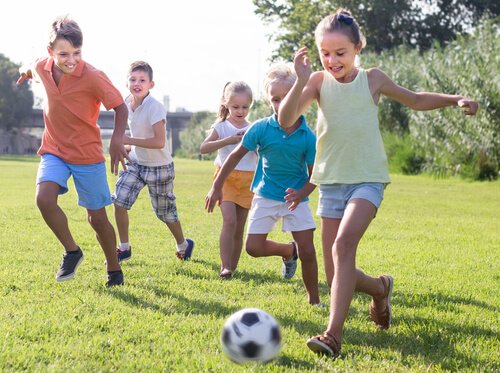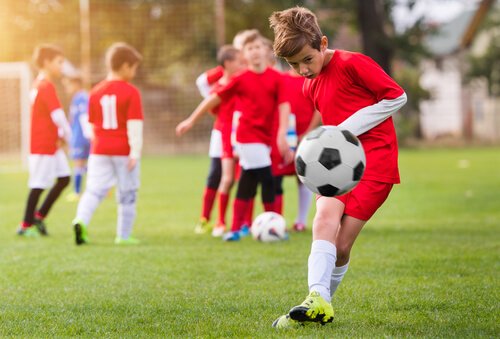The Role of Psychology in Youth Soccer

Psychology is an essential part of youth soccer. It helps you analyze the role that a child’s environment plays in this sport. Parents’ behavior, methods used by the coaches, and the children’s attitudes are some of the pillars of youth sports. The failure or success of a youth soccer team ultimately depends on these pillars.
Soccer is probably the most popular sport on a global scale. Millions of people enjoy it in soccer fields or through the media. Also, everyone has their own opinion about the game. This goes for the public, fans, journalists, players, and coaches.
As such, this is a sport with a huge social and economic impact, no matter if it’s professional, high-performance, or youth soccer.
The Role of Psychology in Youth Soccer
In the last few years, the importance of youth soccer has increased. It’s also become an area of interest for applied sports psychology. Given its characteristics, it can be a great tool for parents who are trying to raise their children in a healthy and appropriate way.
Many youth sports teams use psychologists to help them develop sports strategies. They also help establish effective communication techniques among players. In addition, psychologists can develop appropriate rules for conduct. These can be very helpful to young children when they have to deal with success and failure in the field.

Why is Psychology Important in Youth Soccer?
Psychologists and coaches often favor psychological development in youth sports more than scores. Many believe that the goal should be to enjoy the sport, build healthy life habits, and transmit values. Nevertheless, some soccer fans don’t agree with this perspective. They argue that doing this is denying the essence of the sport. They argue that you should incentivize healthy competitiveness. The field is one of the best places to build this quality.
Petra María Pérez Alonso-Geta, who’s an anthropology professor at the University of Valencia, has an opinion on this issue. She asserts that the problem these days is that elite soccer players are the greatest social role models. For children, playing soccer is more than just about a game. It’s more like going on stage and playing a very important role. If they win and are good at the game, they know they’re going to gain the admiration and praise of their parents, coaches, and teammates. Needless to say, this can also lead them to feel a lot of pressure.
Sports psychologists are usually more concerned about instilling values in their players. At the same time, they train said players in techniques and tactics. That’s because this professional knows that a child who has learned the value of effort during training will be more prepared to give the game their all when the time comes during an actual match. Nevertheless, most sports psychologists always downplay the importance of the results.
“I have the chance to do for a living what I like the most in life, and that’s playing football. I can make people happy and enjoy myself at the same time.”
-Ronaldinho-
The Five Keys to Success in Youth Soccer, According to Psychology
Sports psychologists know the importance of encouraging children to adopt certain values in sports. When they do this, they prepare them for something much more important than just scoring points. In reality, they’re giving them life training. Below, we’ll take a look at the main areas youth soccer psychology is centered on:
1. Personal Effort
One of the essential ideas sports psychologists instill into their players is that you won’t reach any goals without effort. It’s important for children to realize that persistence and hard work lead to self-development. Also, they contribute to the success of the team as a whole
A lack of individual willpower can end up causing the whole group to fail. It’s important to produce this basic internal energy to face difficulties. Any team sport is going to involve challenges and sacrifices.
2. Teamwork
Sports psychologists should teach children to face the humbling reality that no one is indispensable. In a team, everyone works toward a common goal. Teaching this concept should be a part of their daily training.
Soccer requires teamwork. Every team knows that they have a group goal where they can only achieve success through the effort of each and every player.
3. Boosting Self-Esteem
Sports psychologists create personalized and team plans to boost self-esteem at the beginning of the season. The key to achieving this lies in the team working together intelligently to achieve their goals.

4. Building Empathy
Working on a characteristic such as empathy is one of the most difficult challenges for sports psychology. That’s because it’s very difficult to teach children what it means to put themselves in another person’s shoes.
Empathy makes people understanding, community-oriented, generous, and, above all, better team players. That’s why using soccer to develop it can be very beneficial for young people.
5. Teaching Respect
Some rules in soccer aren’t negotiable. For example, the prohibition of physical or verbal violence as well as respect toward other players. With this as a foundation, the team can then follow a democratic process for establishing the rest of the rules. Nevertheless, respect should always be inherent in each of them.
Role model figures, such as parents, coaches, and educators, should also behave respectfully. They should always keep in mind that they’re examples for young children to follow.
In conclusion, psychology can turn youth soccer into much more than just a sport. With this set of tools, trainers can use the sport to instill positive values in children. They can also use it to teach children how to be better people and create a more respectful society.
“I’m more concerned about being a good person than being the best player in the world.”
-Lionel Messi-
This text is provided for informational purposes only and does not replace consultation with a professional. If in doubt, consult your specialist.








